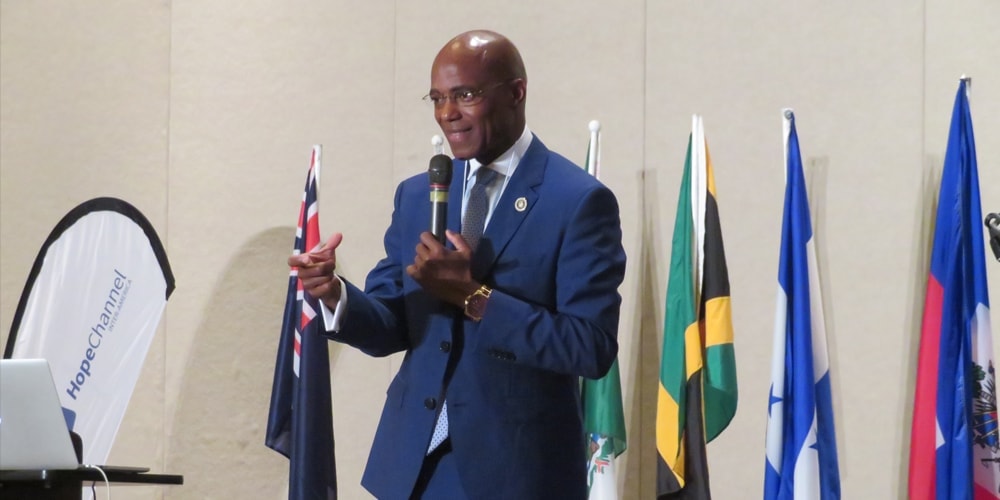
“The workplace is the new evangelistic field,” said Andrew Harewood in his plenary presentation at this year’s Inter-American Division Adventist Laymen’s Services and Industries Inter-America (IAD-ASi) annual convention in Nassau, The Bahamas, on August 22, 2019.
Harewood, a motivational speaker, counselor, and army chaplain from the United States, told Seventh-day Adventist church members and leaders that this new reality should inform everything they do, from worship to outreach to evangelistic endeavors.
“To be a leader in the twenty-first century, it is essential to understand what contemporary leadership entails,” Harewood said. “The key is to learn how to mentor today for leadership that looks beyond tomorrow.”
Understanding How Organizations Work
One of the critical elements for leaders to be successful, Harewood said, is to understand how organizations work. Quoting management consultant and educator Peter Drucker, Harewood explained that “only three things happen naturally in organizations: friction, confusion, and underperformance. Everything else requires leadership.” It is the reason, Drucker and others believe, that leaders should be intentional about what they want to achieve.
As a faith-based organization, the Seventh-day Adventist Church is also part of this dynamic, Harewood said. “But why is this notion of leadership important for any organization, including the Seventh-day Adventist Church?” Harewood asked. Quoting author Patrick Lencioni, he explained, “If you could get all the people in any organization rowing in the same direction, you could dominate any industry, in any market, against any competition, at any time.”
Harewood explained that reaching organizational greatness implies at least four characteristics, namely, sustained superior performance, loyal members, engaged members, and a distinctive contribution. “It is what takes an organization from being good to being great,” he said.
The Role of Leaders
For any church or lay-led initiative to be successful, Harewood said, we should never underestimate the role of great leaders. He defined great leaders as people who inspire trust, clarify purpose, align systems, and unleash talent. “Great leaders understand that leadership is action, not position,” he reminded the group.
Great leaders also respect what Harewood called “the Ten Commandments of Leadership.” He mentioned, among others, the leader’s efforts to affirm rather than belittle; to communicate clearly and by example; to view rank as a responsibility and not a privilege; and to be competent and confident enough to take risks. Quoting author Stephen Covey, Harewood called his audience to remember that “‘leadership is communicating to people their worth and potential so clearly that they come to see it in themselves.’”
A Shift in Focus
At the same time, Harewood reminded his listeners, for Adventist outreach initiatives to be successful, it is crucial that leaders are aware of current societal trends. “Remember that especially for young people, the center of societal focus has shifted from a church-centered approach to something substantially different,” he said.
This shift is producing substantial changes in people’s behavior, Harewood said. “Every relevant survey shows that for new generations, spirituality is more important than [organized] religion. Many young people grew up in the church but never attend a church,” he shared. “The truth is that nowadays, you can shape leaders at your workplace much faster than leaders can do at other venues.”
The operating environment of society itself is changing, Harewood explained. “Historically, it went from a nomadic civilization to an irrigation civilization and now to a knowledge civilization,” he said. Thus, he explained, the current operating environment shows that people have moved from finding community in their village to seeing it at their workplace.
Implications for the Church
It is something, Harewood said, that presents challenges for the outreach work of the church. “As that village-centered religious connection disappears, the church needs to find ways of nurturing that religious connection in the workplace.”
It’s all about adapting our methods to connect people to a religious community, Harewood emphasized. “The workplace can be that place where the sacred and the secular intersect,” he said, “a place that becomes a spiritual domain and where our Christian identity is defined and discussed. Indeed, the workplace is the new evangelistic field.”